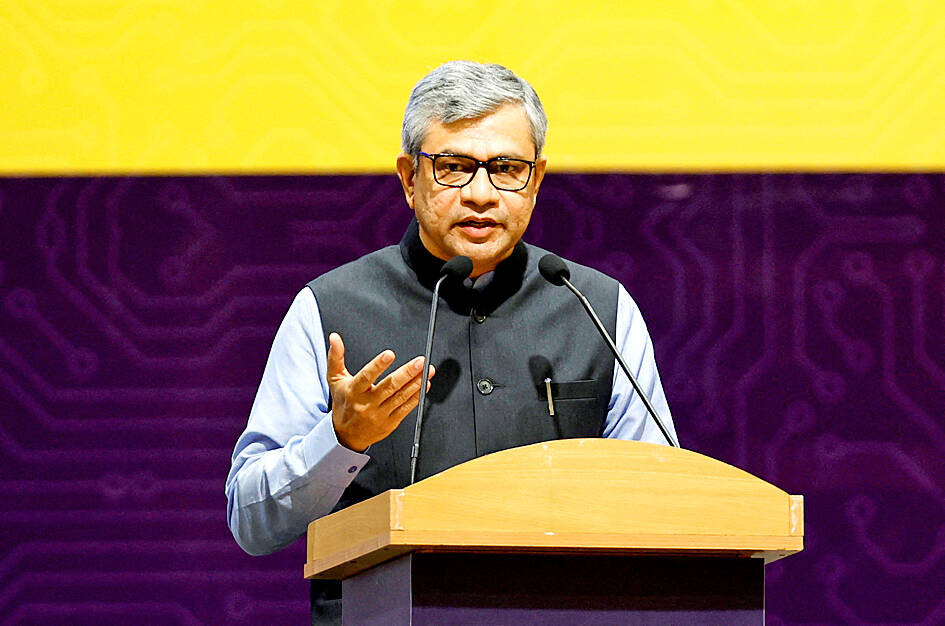India’s government has approved US$15.2 billion worth of investments in semiconductor fabrication plants, including a Tata Group proposal to build the country’s first major chipmaking facility.
Indian Prime Minister Narendra Modi’s Cabinet approved Tata’s plan to build a US$11 billion site that can fabricate about 50,000 wafers per month, Indian Minister of Railways, Communications and Electronics and Information Technology Ashwini Vaishnaw told reporters in New Delhi yesterday.
The Indian government also cleared Tata’s separate proposal for a US$3 billion-plus chip assembly plant, and a packaging venture between Japan’s Renesas Electronics Corp and the Murugappa Group’s CG Power and Industrial Solutions Ltd.

Photo: Reuters
“We will start construction of this plant within 100 days,” the minister said during the briefing, referring to Tata’s fab.
India hopes to attract chip giants to boost its domestic manufacturing sector. The government has offered to shoulder half the cost of any approved projects, up to an initial ceiling of US$10 billion. The semiconductor fund has already helped US memory maker Micron Technology Inc establish a US$2.75 billion assembly facility in Gujarat.
Taiwan’s Powerchip Semiconductor Manufacturing Corp (PSMC, 力積電) yesterday confirmed that it would assist Tata Electronics Pvt Ltd to build India’s first 12-inch wafer fab in Dholera, Gujarat.
The fab construction will begin this year, Powerchip said in a statement, adding that the new facility is expected to create more than 20,000 jobs in India.
Through the cooperation with Powerchip, Tata Electronics, a subsidiary of Tata conglomerate, plans to produce power management ICs, display driver ICs as well as microcontrollers and high-performance computing logic chips as it aims to enter the automotive, computing and data storage, wireless communications, artificial intelligence and other end markets, the Taiwanese chipmaker said.
Semiconductors have grown into a key geopolitical battleground, with the US, Japan and China investing heavily in developing domestic capabilities.
The cooperation between PSMC and Tata is “indeed timely” at this critical moment of the global restructuring of high-tech supply chain, Powerchip chairman Frank Huang (黃崇仁) said in the statement.

Vincent Wei led fellow Singaporean farmers around an empty Malaysian plot, laying out plans for a greenhouse and rows of leafy vegetables. What he pitched was not just space for crops, but a lifeline for growers struggling to make ends meet in a city-state with high prices and little vacant land. The future agriculture hub is part of a joint special economic zone launched last year by the two neighbors, expected to cost US$123 million and produce 10,000 tonnes of fresh produce annually. It is attracting Singaporean farmers with promises of cheaper land, labor and energy just over the border.

US actor Matthew McConaughey has filed recordings of his image and voice with US patent authorities to protect them from unauthorized usage by artificial intelligence (AI) platforms, a representative said earlier this week. Several video clips and audio recordings were registered by the commercial arm of the Just Keep Livin’ Foundation, a non-profit created by the Oscar-winning actor and his wife, Camila, according to the US Patent and Trademark Office database. Many artists are increasingly concerned about the uncontrolled use of their image via generative AI since the rollout of ChatGPT and other AI-powered tools. Several US states have adopted

A proposed billionaires’ tax in California has ignited a political uproar in Silicon Valley, with tech titans threatening to leave the state while California Governor Gavin Newsom of the Democratic Party maneuvers to defeat a levy that he fears would lead to an exodus of wealth. A technology mecca, California has more billionaires than any other US state — a few hundred, by some estimates. About half its personal income tax revenue, a financial backbone in the nearly US$350 billion budget, comes from the top 1 percent of earners. A large healthcare union is attempting to place a proposal before

KEEPING UP: The acquisition of a cleanroom in Taiwan would enable Micron to increase production in a market where demand continues to outpace supply, a Micron official said Micron Technology Inc has signed a letter of intent to buy a fabrication site in Taiwan from Powerchip Semiconductor Manufacturing Corp (力積電) for US$1.8 billion to expand its production of memory chips. Micron would take control of the P5 site in Miaoli County’s Tongluo Township (銅鑼) and plans to ramp up DRAM production in phases after the transaction closes in the second quarter, the company said in a statement on Saturday. The acquisition includes an existing 12 inch fab cleanroom of 27,871m2 and would further position Micron to address growing global demand for memory solutions, the company said. Micron expects the transaction to